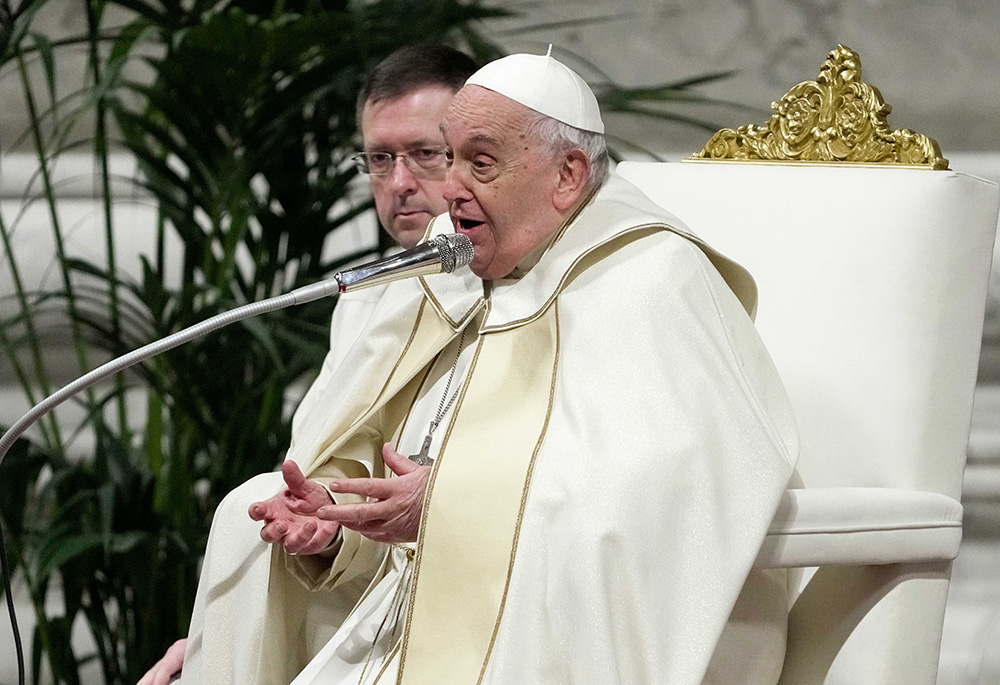
Pope Francis gives his homily during Mass for the feast of Our Lady of Guadalupe in St. Peter’s Basilica at the Vatican on Dec. 12, 2024. (CNS/Lola Gomez)
If you were to wrap up 2024 in the news, the headline would read one word: "Trump." The U.S. presidential election dominated the cycle, including here at the National Catholic Reporter.
Stories of immigration, Catholic voters, anti-abortion agendas and swing states showed up on our pages this past year, but so did coverage of the final assembly of the synod on synodality.
And yet, NCR readers were most fascinated by one topic in 2024: clergy behaving badly. Some of the most read stories for this past year included excommunicated priests, a damaged altar, the U.S. bishops' conference slashing staff and some still questioning the authority of Pope Francis.
These were NCR's most read — not necessarily the most important — news stories of the year. They are listed in order by the number of website visitors who read the story, with short summaries of their contents. We'll post a separate article about our most read opinion and commentary pieces later this week.
This screengrab shows Fr. Alessandro Minutella of Palermo, Italy, (left) and an undated photo of Fr. Ramon Guidetti of Livorno as they speak on the web radio program Radio Domina Nostra Jan. 2, 2024. Minutella was excommunicated in 2018 for spreading "heresy and schism" and Guidetti was excommunicated for a schismatic act Jan. 1, 2024. They both publicly hold that Pope Francis is an antipope and the late Pope Benedict XVI had continued to be the "true pope." (CNS screengrab/Radio Domina Nostra)
1. Italian priest excommunicated for slandering Pope Francis during Mass, published Jan. 3, 2024
In January, an Italian Catholic priest was excommunicated for having publicly committed "an act of a schismatic nature" while celebrating Mass at his parish near Livorno.
The priest, Fr. Ramon Guidetti, dedicated his homily Dec. 31, 2023, to marking the anniversary of the death of Pope Benedict XVI, whom he named as being "the true pope" who "never fled the barque of Peter."
In his 20-minute homily, the 48-year-old priest detailed the qualities of "real priests" and cardinals versus those who side with "Bergoglio [Pope Francis] and his mercenaries." He said the See of Peter is occupied by a "masonic Jesuit tied to a group of globalists, an antipope usurper."
Bishop Simone Giusti of Livorno issued the decree declaring the priest's excommunication Jan. 1, 2024, and posted it on the diocese's website.
Italian Archbishop Carlo Maria Viganò, then apostolic nuncio to the United States, is seen at the Vatican in a Oct. 20, 2011, file photo. (CNS photo/Paul Haring)
2. Archbishop Viganò found guilty of schism, excommunicated by Vatican, published July 5, 2024
Italian Archbishop Carlo Maria Viganò, the disgraced former papal nuncio to the United States who questioned the legitimacy of Pope Francis and the authority of the Second Vatican Council, was found guilty of schism and excommunicated, the Vatican announced on July 5.
"His public statements manifesting his refusal to recognize and submit to the Supreme Pontiff, his rejection of communion with the members of the Church subject to him, and of the legitimacy and magisterial authority of the Second Vatican Council are well known," stated a Vatican bulletin that announced the ruling.
The decision of Viganò's excommunication was widely expected following the archbishop's June 20 announcement that he had been charged with schism by the Dicastery for the Doctrine for the Faith and that he would not be cooperating with the Vatican penal process.
Archbishop Charles Scicluna of Malta attends a news conference at the Vatican Oct. 8, 2018. (CNS/Paul Haring)
3. Exclusive: Vatican's abuse expert says ending priestly celibacy could prevent a 'double life', published Jan. 30, 2024
One of the Catholic Church's leading doctrinal officials has reiterated his unusual call for the global institution to consider ending its millennia-long requirement that priests remain celibate, saying that allowing priestly marriage could be a means of preventing clerics from living dangerous double lives.
In an exclusive interview with National Catholic Reporter on Jan. 24, Archbishop Charles Scicluna said: "One of my worries is that people are put in a situation where they are comfortable with a double life."
"This is not to diminish the beauty of celibacy or the heroic commitment of people who have accepted celibacy as a gift and live it," said the archbishop, speaking in an interview at the Vatican's Dicastery for the Doctrine of the Faith for NCR's "The Vatican Briefing" podcast. "But I think it is good that we discuss it."
Earlier in January, Scicluna — who serves as both the Archbishop of Malta and an adjunct secretary of the Vatican dicastery — made headlines when he said he believes it is time to revisit the church's long-standing ban on allowing marriage for most of its clerics.
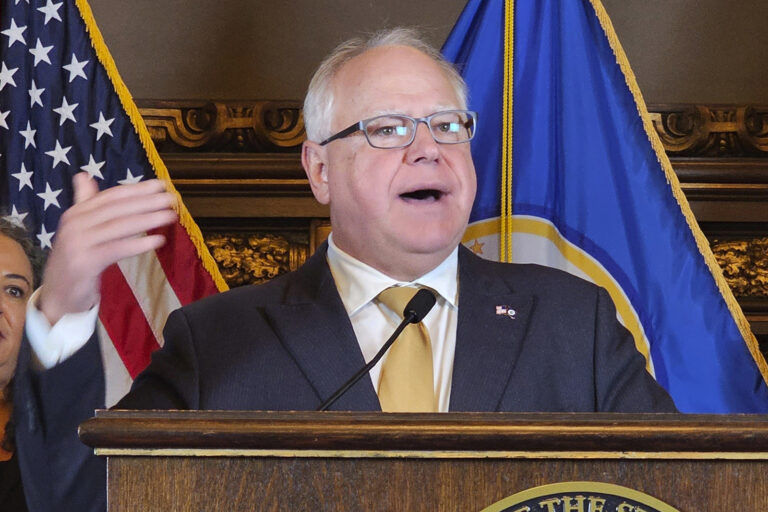
Democratic Minnesota Gov. Tim Walz speaks at a news conference at the Minnesota state Capitol in St. Paul, Aug. 16, 2023. (AP/Steve Karnowski, File)
4. Five faith facts about Harris pick Tim Walz, a 'Minnesota Lutheran' dad, published Aug. 6, 2024
Frenzied speculation over who Democratic presidential nominee Kamala Harris would tap as her vice presidential running mate came to an end Aug. 6, with the current vice president choosing Minnesota Gov. Tim Walz to be her successor should they win in November.
Walz's profile rose in the weeks since President Joe Biden announced he was bowing out of the presidential race. The Midwesterner has appeared regularly on national television programs to make the case for Democrats, coining the now widely adopted "MAGA is weird" line of attack, and winning fans as he advocates for liberal policies with the same folksy charm that's made him popular in his home state.
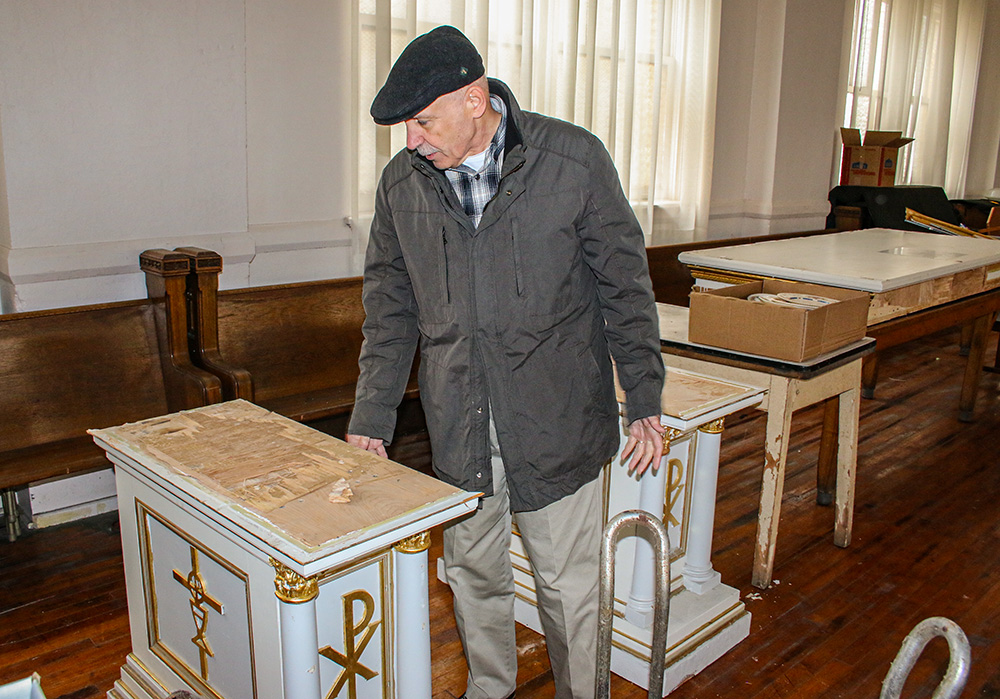
Parishioner Bob Purgert looks at one of the damaged pedestals of the dismantled altar at St. Elizabeth of Hungary Church in Cleveland. (Dennis Sadowski)
5. A Latin Mass community moved in. Then wrecked a historic Vatican II altar, published April 2, 2024
Shaking his head, Bob Purgert tilted one of the pedestals that supported the top of what is now a dismantled altar, stored in an unheated hall on the property of his beloved St. Elizabeth of Hungary Church in Cleveland's economically struggling Buckeye neighborhood.
"They didn't have to do this," a disappointed Purgert, 71, said of the damaged altar. Parishioners are deeply proud of the altar, which parish priest Fr. Julius Zahorszky built in 1966 to accommodate the liturgical reforms of the Second Vatican Council.
Hungarian Cardinal József Mindszenty celebrated Mass at the altar during a 1974 visit to the parish. Pope Francis declared the cardinal, who resisted Hungary's communist government after World War II, venerable in 2019, making the altar a second-class relic if he is canonized a saint.
Purgert's ire is focused on the Chicago-based Institute of Christ the King Sovereign Priest, which since July has been establishing its presence at St. Elizabeth for Latin Mass adherents. The group celebrated its first Latin Mass at the shrine on Sept. 24.
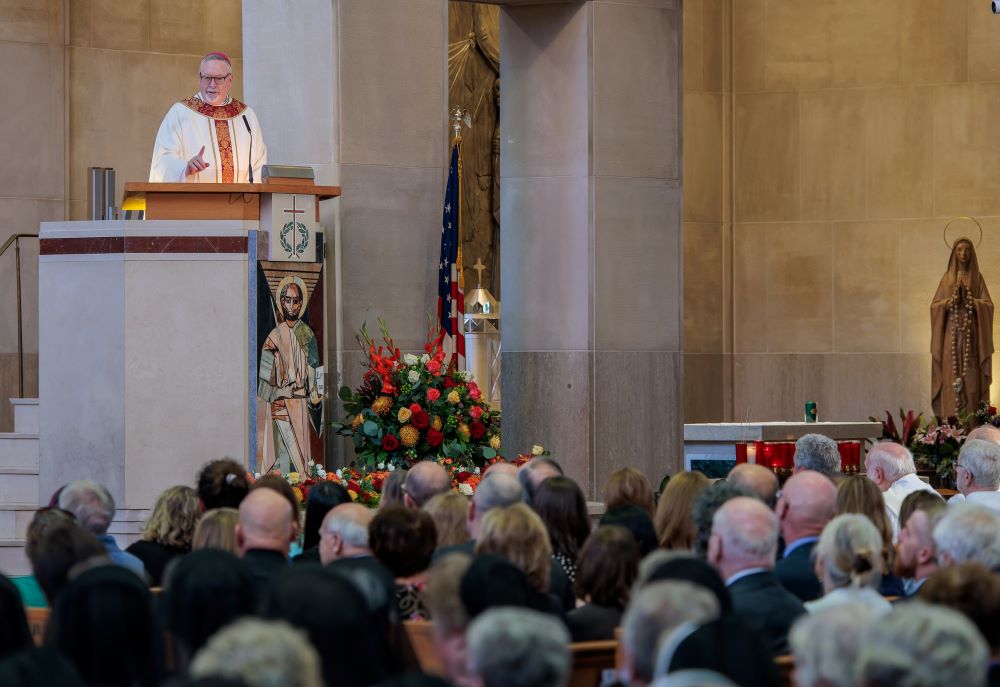
Coadjutor Archbishop Christopher Coyne delivers the homily during a Mass of welcome at the Cathedral of St. Joseph in Hartford, Connecticut, Oct. 9, 2023. (OSV News/Courtesy of Archdiocese of Hartford/Aaron Joseph)
6. Archbishop Coyne says new bishop appointments moving US church in 'right direction,' July 8, 2024
The decision by the U.S. bishops conference to dramatically slash its staff for the department responsible for implementing some of Pope Francis' top priorities has been called "very disappointing" and "somewhat duplicitous" by one of the pontiff's newest archbishops in America.
"I am very disappointed," said Archbishop Christopher Coyne of Hartford, Connecticut. He said he was surprised that less than two weeks after the U.S. bishops' met for their annual spring assembly that the conference's leadership decided to move forward with major layoffs in its social justice department.
Coyne also acknowledged that for some of his brother bishops in the United States, the Francis pontificate has been a difficult adjustment.
"Collectively, I believe we tend to be a more conservative, Republican type of community," he continued. The addition of new bishops more closely aligned with Francis' vision is helping things in "the right direction," he added.
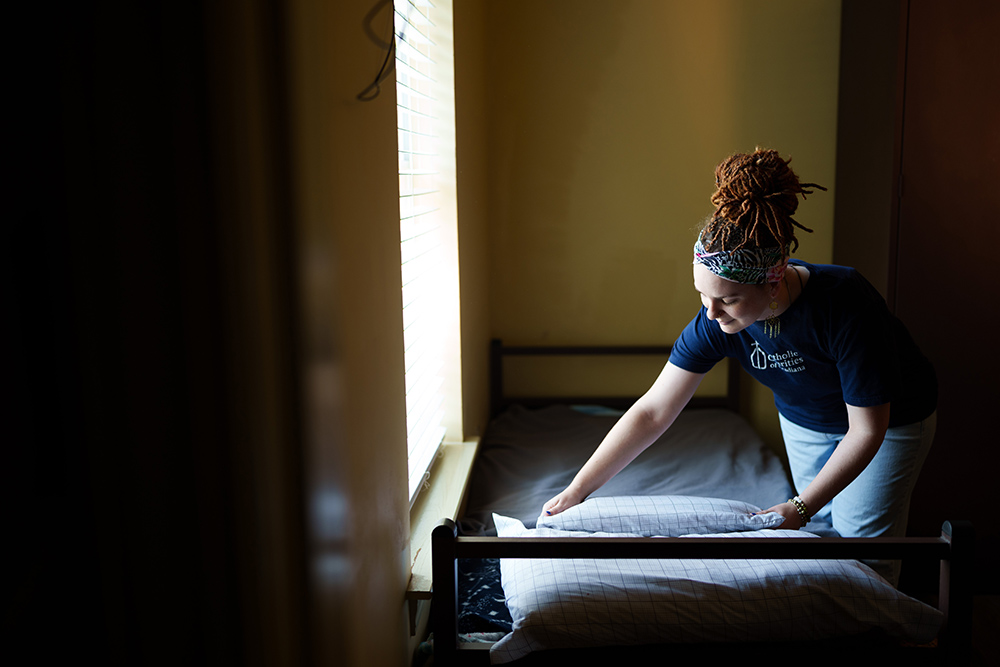
A case worker with Catholic Charities of Acadiana is pictured in a file photo preparing a bed at St. Joseph Shelter, an emergency shelter that cares for 87 individuals experiencing homelessness in and around Lafayette, Louisiana. (OSV News/Courtesy of Catholic Charities of Acadiana/Jason Cohen)
7. Louisiana governor cuts $1 million for Catholic Charities homeless shelter over church's care for migrants, published July 8, 2024
Drastic cuts in state funding for a Catholic Charities' homeless shelter operations in Louisiana over the wider Catholic Church's ministry to migrants have dealt a significant blow to the church's ability to care for area residents experiencing homelessness, including veterans.
Republican Gov. Jeff Landry vetoed $1 million in state funds June 24 for emergency homeless shelter services run by Catholic Charities of Acadiana. Landry later cited the wider work of Catholic Charities, the domestic charitable arm of the Catholic Church in the U.S., in serving migrants as his reason; however, the line item veto financially gutted homeless services by Catholic Charities overwhelmingly serving native Louisianans.
The line item veto also struck funding for other organizations, including $1 million for the Louisiana Endowment for the Humanities.

Candace Owens speaks with attendees at the 2021 Young Women's Leadership Summit hosted by Turning Point USA at the Gaylord Texan Resort & Convention Center in Grapevine, Texas. (Wikimedia Commons/Gage Skidmore, CC-BY-SA 2.0 deed)
8. Candace Owens converts to Catholicism, published April 23, 2024
The firebrand conservative commentator Candace Owens has announced her conversion to Catholicism, a long-expected move for the controversial 34-year-old Black ideologue.
She announced the news on social media April 22, describing it as a "decision to go home."
The change for Owens comes amid shifting sands in her professional life, including an acrimonious exit from The Daily Wire in March following statements she made and supported that were seen as antisemitic.
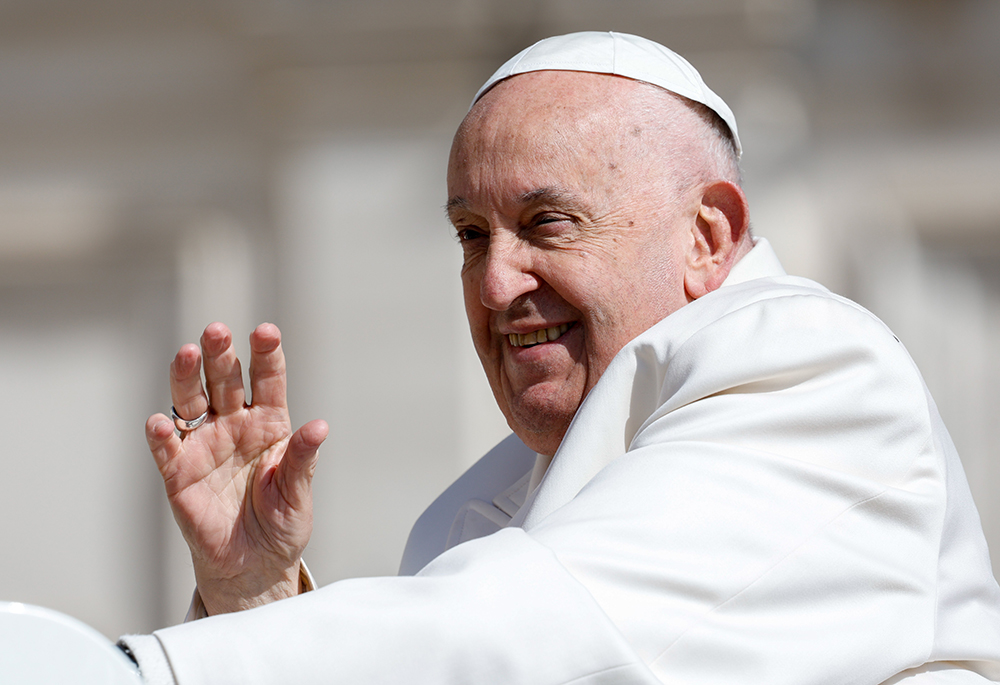
Pope Francis greets people as he rides the popemobile around St. Peter's Square at the Vatican April 25. Francis sent a brief letter to Drachma Parents April 30, responding to their criticism of a Vatican document that condemned gender theory and gender-affirming surgeries. Their original letter to Francis was dated April 23. (CNS/Lola Gomez)
9. Pope responds with 'open heart' to Vatican document criticism from parents of LGBTQ children, published April 30, 2024
Pope Francis has written to a group of Maltese parents of LGBTQ persons, in response to their criticism of a recent Vatican document that condemned gender theory and gender-affirming surgeries. The pontiff told the parents he received their critique with an "open heart."
On April 30, Francis sent a brief letter to Drachma Parents — an outgrowth of a ministry seeking to provide welcome spaces for LGBTQ Catholics and other people of faith — praising what he described as their "very beautiful and good" work.
Both the pope's letter and the original correspondence from the Drachma Parents have been reviewed by the National Catholic Reporter, and Drachma has asked that the full contents of Francis' correspondence remain private.
Advertisement
In their original April 23 letter to Francis, Drachma alleged that the Vatican text, released on April 8 and titled Dignitas Infinita, makes it more difficult for transgender Catholics and their parents to remain in the church and fails to understand the concrete realities of such families. Further, they argued that the Vatican declaration makes it more difficult for parents to accompany LGBTQ children, fails to recognize the complexity of issues around gender and sexuality and is inconsistent with the pope's own approach of pastoral outreach.
Their three-page letter began with effusive praise of Francis, including his December 2023 decision to allow priests to bless individuals in same-sex relationships, his support for decriminalizing homosexuality and his own personal outreach to LGBTQ individuals, including inviting trans women for lunch at the Vatican.
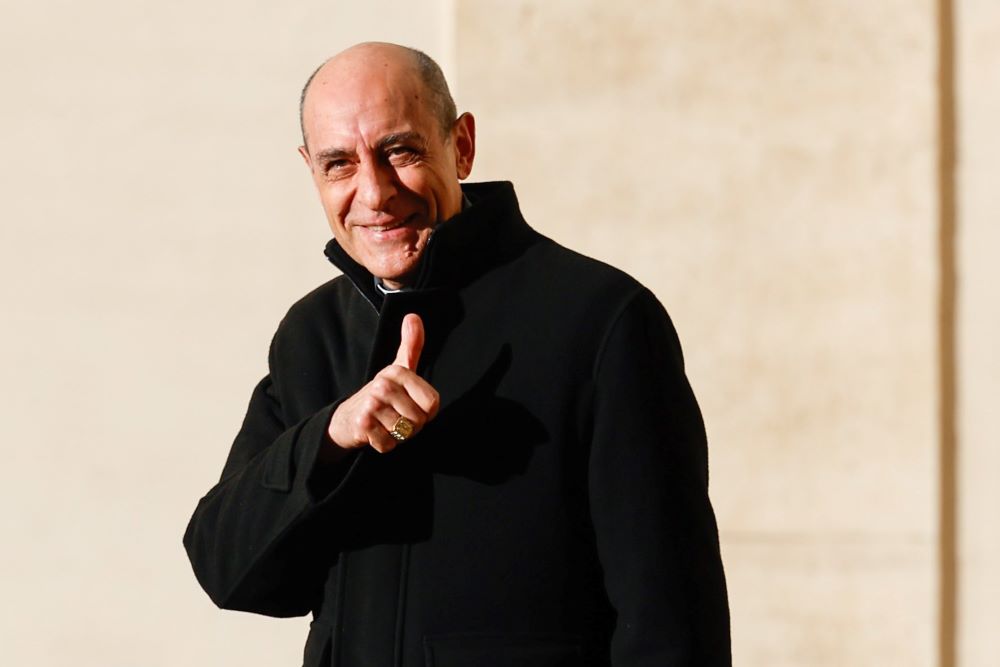
Cardinal Víctor Manuel Fernández, prefect of the Dicastery for the Doctrine of the Faith, gives a thumb up to journalists in the San Damaso Courtyard of the Apostolic Palace at the Vatican Feb. 12. (CNS/Lola Gomez)
10. Pope Francis' rottweiler: Cardinal Fernández charts new, uncertain course for Vatican's doctrinal office, published July 1, 2024
When Pope Francis tapped Cardinal Víctor Manuel Fernández to head the Vatican's doctrinal office on July 1, 2023, he wasn't just naming his longtime Argentine theological adviser to one of the church's most powerful roles. He was also reenvisioning how that department would operate in the modern world and attempting to ensure that his reforms might outlast his own papacy.
Accompanying the announcement of Fernández's appointment in the Vatican's daily bulletin was a letter articulating that as prefect of the Dicastery for the Doctrine of the Faith, he should actively promote the work of theology and new ways of evangelization rather than replicating past "immoral methods" that sought to control or punish theologians.
"The text of the letter that the pope wrote to the new prefect is in some ways an epoch-making event," Italian theologian Andrea Grillo told the National Catholic Reporter. "It marked the official beginning of a new understanding of the function of the dicastery, moving away from the inquisitorial and censorious styles of the past."








